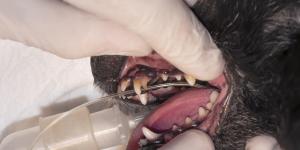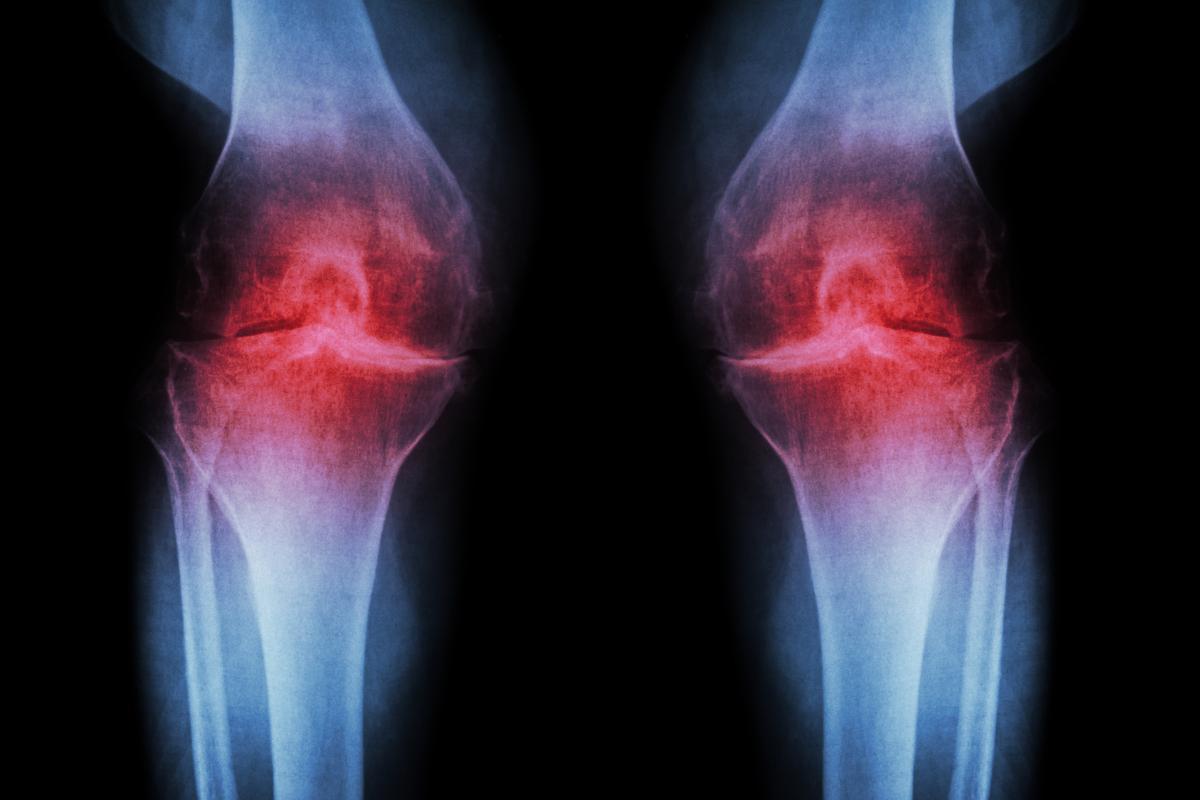Why My Dog Suddenly Screams Out in Pain?



See files for Dogs
Has your dog ever let out a sudden yelp or cry of pain, leaving you perplexed and concerned? These unexpected vocalizations can be alarming, especially when there's no obvious cause for their distress. Sometimes, the cause of your dog's sudden yelp might be a chronic or progressive condition that has gradually worsened over time. In other instances, the pain might be acute, arising from a recent injury or underlying health issue. Understanding the potential reasons behind your dog's pain is crucial for their well-being and your peace of mind.
In this AnimalWised article, we'll delve into the various reasons why your dog might suddenly scream in pain, helping you decipher their cries and seek appropriate veterinary care when necessary.
Osteoarthritis
If you've noticed your dog suddenly yelping or crying out in pain without being touched, it's important to understand the potential causes behind this behavior. Joint problems, particularly osteoarthritis, are a common culprit for these unexpected pain episodes. Osteoarthritis commonly affects older dogs, but it can also occur in younger dogs due to genetic predisposition, injuries, or excessive joint stress.
Osteoarthritis, also known as degenerative joint disease, is a progressive condition that affects the cartilage cushioning the joints. As this cartilage wears down, the underlying bone becomes exposed, leading to inflammation, stiffness, and pain. In an attempt to protect the joint, the body may produce extra bone around the affected area, further limiting mobility.
While this extra bone formation aims to reduce friction and pain, it can also lead to muscle imbalances and overloading of other joints. These secondary issues can sometimes cause even more discomfort than the osteoarthritis itself.
Sudden pain episodes can be triggered by simple movements, such as getting up from a lying position or walking on uneven surfaces.

Discospondylitis
If your dog suddenly yelps or cries out in pain, a spinal infection, known as discospondylitis, could be the underlying cause. This infection affects the intervertebral discs, the shock-absorbing cushions between vertebrae that prevent friction and allow for smooth movement.
Discospondylitis is characterized by inflammation and infection of these intervertebral discs, leading to bone deformation, irritation, and pain. In severe cases, the inflammation can compress the spinal cord, causing neurological symptoms such as gait abnormalities or even paralysis.
The infection typically arises when bacteria or fungi from other parts of the body, such as the mouth, respiratory system, or genitourinary tract, spread through the bloodstream and lodge in the intervertebral discs.
Symptoms of discospondylitis in dogs include:
- Reluctance to walk, jump, or climb stairs
- Stiffness or hunched posture
- Weakness or wobbliness in the hind legs
- Loss of bladder or bowel control
If you suspect your dog might have discospondylitis, prompt veterinary attention is crucial. Diagnosis typically involves imaging studies like X-rays or MRIs to visualize the affected discs and rule out other causes of pain. Treatment often involves a prolonged course of antibiotics or antifungals to eliminate the infection and manage inflammation. In severe cases, surgery may be necessary to stabilize the spine and relieve compression on the spinal cord.
Navigate the intricacies of fungal infections in dogs and safeguard your canine companion's health by delving into our comprehensive guide on fungal infection in dogs.

Low back pain
When dogs experience intense pain in the upper part of their back, near the tail, in the region of the lumbosacral muscles, it's referred to as low back pain or lumbosacral pain. This condition causes increased muscle tone, tension, and rigidity, leading to pain due to muscle contracture and inflammation.
Dogs with low back pain may suddenly yelp or cry out when moving, being touched, or jumping.
The underlying causes of low back pain can include:
- Muscular overloads from strenuous activity or excessive exercise.
- Trauma or injuries to the back.
- Fractures or dislocations of the vertebrae.
- Osteoarthritis, a degenerative joint disease affecting the spine.
- Lumbosacral or cauda equina stenosis, a narrowing of the spinal canal.
- Impingements, where nerves are compressed by surrounding structures.
- Advanced age, which increases the risk of degenerative changes in the spine.
- Spinal inflammation, such as discospondylitis.
- Tumors or infections affecting the spine.
Symptoms of low back pain in dogs include:
- Pain, especially when moving, jumping, or being touched in the affected area.
- Tingling or numbness in the hind legs.
- Reduced mobility and reluctance to engage in activities.
- Stiffness or hunched posture.
- Weakness or wobbliness in the hind legs.
If your dog exhibits signs of low back pain, it's essential to consult your veterinarian for a thorough examination and diagnosis. Treatment for low back pain depends on the underlying cause.
Embrace a proactive approach to your dog's lower back health and comfort by delving into our informative guide on lower back pain in dogs.
Arthritis
Arthritis, a common cause of pain and discomfort in dogs, is an inflammation of the joints that can affect dogs of any age. It involves inflammation of the protective layers surrounding the joints, leading to soreness, stiffness, and reduced mobility.
Like osteoarthritis, arthritis is a degenerative condition that worsens over time. As the disease progresses, the protective cartilage within the joints deteriorates, causing bones to rub against each other, leading to further inflammation and pain.
Arthritis can arise due to various factors, including:
- Trauma or injuries to the joints.
- Infections affecting the joints.
- Genetic predisposition to joint problems.
- Immune-mediated conditions where the body's immune system attacks the joint tissues.
- Overweight or obesity, which puts excessive strain on the joints.
Symptoms of arthritis in dogs include:
- Stiffness, especially after periods of rest.
- Reduced mobility and reluctance to engage in activities.
- Limping or favoring a particular limb.
- Difficulty getting up or lying down.
Treatment for arthritis in dogs aims to manage pain, reduce inflammation, and improve joint function. Early diagnosis and appropriate treatment can help manage arthritis in dogs and improve their quality of life. Regular veterinary checkups can help monitor the condition and adjust treatment as needed.
Empower yourself with knowledge and navigate the challenges of arthritis in dogs with confidence. Delve into our comprehensive guide on arthritis in dogs.

Fractures
Fractures, the breakage of one or more bones, are another potential cause of sudden yelping or crying out in dogs. Fractures typically result from significant force or trauma, such as fights between dogs, falls, accidents, or collisions. Dogs with fractures often express pain when picked up or touched in the affected area.
While fractures commonly occur in the legs, they can also affect other bones, including the pelvis, ribs, or jaw. Pain is the primary symptom of fractures, accompanied by inflammation, swelling, and possible bruising.
Depending on the location of the fracture, additional symptoms may include:
- Loss of appetite and difficulty eating with jaw fractures.
- Limping or hind limb paralysis with pelvic fractures.
- Respiratory distress with rib fractures.
If you suspect your dog has a fracture, immediate veterinary attention is crucial. Your veterinarian will perform a thorough examination, including X-rays or other imaging studies, to determine the location and severity of the fracture.
During the healing process, it's essential to restrict your dog's activity and follow your veterinarian's instructions carefully. With proper care and treatment, most fractures heal well, and dogs can return to their normal activities. However, some fractures may have long-term consequences, such as arthritis or reduced range of motion.

Otitis
If your dog yelps or cries out when you touch their ears, an ear infection, also known as otitis, could be the culprit. Certain breeds, particularly those with long, drooping ears, are more prone to ear infections due to their ear canal structure. These breeds include dachshunds, beagles, and spaniels. Their narrow, hairy ear canals create a favorable environment for bacteria and fungi to thrive.
Symptoms of ear infections in dogs include:
- Swelling and pain in the ear.
- Sudden yelping or crying out when the ear is touched.
- Redness and inflammation of the ear canal.
- Excessive scratching or rubbing of the ears.
- Head shaking or tilting.
- Ear discharge, which can be clear, yellow, or brown.
- A foul odor emanating from the ears.
If you suspect your dog has an ear infection, prompt veterinary attention is essential. Your veterinarian will examine the ears, check for discharge, and possibly take a sample for testing to identify the type of infection.
Treatment typically involves ear cleaning solutions to remove debris and topical or oral medications to address the underlying infection.
To prevent ear infections in dogs, regular ear cleaning is recommended, especially for breeds with long, drooping ears. Keep the ears dry after bathing or swimming, and avoid using cotton swabs, which can push debris further into the ear canal. Regularly check your dog's ears for signs of inflammation, redness, or discharge.
Safeguard your dog's ear health and prevent discomfort with insights from our comprehensive guide on external otitis in dogs.

Gastrointestinal diseases
When a dog suddenly screams and trembles, it could indicate gastrointestinal (GI) problems. Unlike cats, who often hide their discomfort, dogs tend to express their pain more openly. Gastrointestinal issues that can cause sudden yelping or crying out include:
- Infectious or non-infectious gastroenteritis: inflammation of the stomach and intestines, caused by pathogens like bacteria or viruses, or by dietary indiscretion, allergies, or toxins.
- Inflammatory bowel disease (IBD): a chronic condition characterized by inflammation of the intestinal lining, leading to pain, diarrhea, and weight loss.
- Tumors: growths in the GI tract, which can cause pain, obstruction, and bleeding.
- Intussusception: a serious condition where a part of the intestine telescopes into itself, causing blockage and severe pain.
In addition to sudden yelping or crying out, dogs with GI problems may exhibit other symptoms such as:
- Vomiting or regurgitation
- Diarrhea or constipation
- Loss of appetite
- Lethargy
- Abdominal pain
- Weight loss
If your dog exhibits these signs, prompt veterinary attention is crucial. Your veterinarian will perform a thorough examination, including abdominal palpation, and may recommend diagnostic tests like blood work, fecal analysis, or imaging studies to identify the underlying cause.
With prompt diagnosis and appropriate treatment, many GI problems in dogs can be successfully managed, allowing them to regain their health and vitality.
Become a proactive guardian of your dog's digestive health and well-being. Explore our informative guide on intestinal blockage in dog.
Pinched nerves
Pinched nerves, also known as nerve impingements, can indeed cause sudden yelping or crying out in dogs.
These occur when a nerve is compressed or irritated by surrounding structures, such as muscles, tendons, cartilage, or bones. The compression can lead to intense pain, tingling, weakness, numbness, muscle spasms, or joint stiffness in the area supplied by the affected nerve.
The sciatic nerve, the largest nerve in dogs, extends from the lumbar region to the hind legs. When this nerve is pinched, dogs may experience severe pain and yelping, particularly when moving or trying to stand up. Early diagnosis and treatment are crucial for pinched nerves, as prolonged compression can lead to nerve damage and even herniation, which may require surgical intervention.
Symptoms of a pinched nerve in dogs include:
- Sudden yelping or crying out, especially when moving or being touched.
- Pain in the affected area, which can be sharp, burning, or tingling.
- Weakness or difficulty moving the affected limb.
- Limping or favoring the unaffected limb.
- Muscle spasms or twitching.
- Numbness or tingling in the affected area.
With prompt diagnosis and appropriate treatment, most dogs with pinched nerves can recover well and regain their normal mobility. However, it's important to follow your veterinarian's instructions carefully and restrict your dog's activity during the healing process to prevent further injury.
What to do if my dog suddenly screams in pain?
If your dog suddenly yelps or cries out in pain, it's crucial to seek veterinary attention to determine the underlying cause and initiate appropriate treatment. Here's a summary of treatment approaches for different causes of pain in dogs:
Fractures
- Immobilization with splints or casts.
- Surgical fixation with pins, plates, or screws.
- Pain medication to alleviate discomfort.
Muscle or inflammatory pain
- Anti-inflammatory drugs to reduce inflammation.
- Rest and restricted activity.
- Cold compresses to reduce swelling.
Gastrointestinal problems
- Dietary modifications or prescription diets.
- Medications to control vomiting, diarrhea, or inflammation.
- Fluid therapy to address dehydration.
- Antibiotics or antiparasitics for infections.
Otitis (ear infections)
- Topical antibiotic and/or antifungal medication.
- Ear cleaning solutions to remove debris.
General pain management
- NSAID-type analgesics like carprofen, meloxicam, or ketoprofen.
- Opiates for severe pain, under veterinary supervision.
Never administer human pain medications like ibuprofen or paracetamol to dogs, as these can be toxic to them.
Maintaining a healthy weight for your dog is essential to reduce the risk of various health issues, including joint problems, which can contribute to pain.
Remember, prompt veterinary attention is crucial for any sudden or unexplained pain in your dog. Early diagnosis and appropriate treatment can help alleviate discomfort, improve your dog's quality of life, and prevent further complications.
Become your dog's pain detective and decipher their silent cries for help. Delve into our comprehensive guide on signs of pain in dogs.
This article is purely informative. AnimalWised does not have the authority to prescribe any veterinary treatment or create a diagnosis. We invite you to take your pet to the veterinarian if they are suffering from any condition or pain.
If you want to read similar articles to Why My Dog Suddenly Screams Out in Pain?, we recommend you visit our Other health problems category.
- J. Cerón, MJ Fernández, C. García, M. Hervera, SM Angulo, D. Pérez, C. Pérez, G. Santamarina. (2016). Clinical manual of internal medicine in small animals I. ESVPS, Ed. SM Publishing Ltd. Sheffield, UK.










